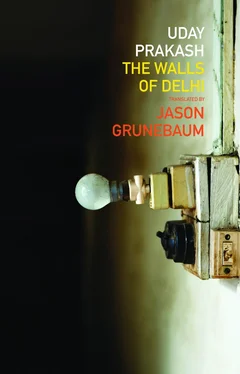While eating at the Fatso’s Vaishnava Pure Vegetarian Food Stall he found out that although there were two state transport buses only one private line had an evening service to the area near his village, Purbanra. He decided to take a look around Lenin Nagar, the coal miners’ colony. He might see someone he knew, maybe someone he studied with at college, maybe someone else.
He lost his way in Lenin Nagar. It was afternoon, all of the apartment buildings looked alike, and everyone was at work in the mines. Only women and children were at home. A school bus was making stops and unloading schoolchildren who were walking on ahead. Lenin Nagar was an enormous residential colony. If I hadn’t had the wool pulled over my eyes and been played for a fool, Mohandas thought, I would have been living in one of these flats with my family, bringing home a pay cheque; Devdas and Sharda would have been going to school wearing little uniforms and shoes and socks and getting off the school bus. We’d have a fan or cooler to help us sleep at night. But how totally ludicrous that in order to find out where Bisnath’s flat was, he’d have to ask for his own name.
‘Hi there friend, can you tell me where Mohandas lives?’
‘Who? You mean supervisor sahib?’
‘That’s the one!’
‘Go straight ahead, make a left at the fourth bylane, it’s the third house, A/11, next to Dr Janardan Singh’s flat.
The door to the apartment was closed. The brass plate affixed to the wall outside read, ‘Mohandas Viswakarma, Deputy Depot Supervisor, Oriental Coal Mines.’
He stood reading that for a little while before ringing the doorbell below the brass plate. The sound gave him a start since the hard ring was identical to the clerk’s desk buzzer, the one that caused calamity.
A fourteen-or fifteen-year-old boy answered the door.
‘Sahib’s not at home, he just left for the market to go drink a lassi,’ the boy said in one breath.
‘Could I have a glass of water?’
Mohandas was very thirsty, the hot sun had been beating down on him, and the wind blew like a furnace. He was wilting. He’d been nicked and bruised on his face, arm, and back during his beating and subsequent ejection from the office compound, and the dried sweat was coagulating the blood in the cuts.
The boy looked him over head to toe.
‘Wait here, I’ll be right back.’ He went inside.
Mohandas gulped down three glasses; the boy’d brought a cold bottle of water from the fridge. The water rejuvenated his body, brought the light back to his eyes, and calmed him. He noticed the boy’s sympathetic look as he took the glass back.
‘Who else is at home?’ Mohandas asked.
‘Nobody. Just Kasturi madamji. But she’s sleeping. Come back after five.’ When the boy started back in with the empty bottle, Mohandas said, ‘When sahib comes back tell him that Mohandas from Purbanra village stopped by. I’ll come back this evening.’
The boy stopped. He looked quizzically at Mohandas. ‘Who? Who should I say stopped by?’
‘Mohandas!’ Mohandas said a little louder, before slowly returning to the May inferno and the nearly melting pavement.
There wasn’t much to Lenin Nagar market, though it ached for a modern makeover. There were a handful of dry-goods stores, a few convenience shops with some groceries. A Kaveri Fast Food that served dosas-idlis-vadas. Two food shacks with the usual tandoori, dhal makhini, kadhai paneer, butter chicken, aloo paratha. A liquor shop with whisky and local toddy with a sign outside that read, ‘Cold Beer Available.’ Two cigarette and paan stalls, and two stores with proper glass window displays that carried all sorts of plastic stuff, small electric appliances and electronics. Then another cavernous apparel store with a show window featuring crude foam mannequins modeling lacy bras and underwear that showed off everything.
Mohandas saw a police Tata Sumo parked in front of Lakshmi Vaishnav Restaurant, and among the handful of police inside drinking lassis was Vijay Tiwari from Mohandas’s village, son of Pandit Chatradhari Tiwari, who’d been fixed up with a police inspector position by his in-laws.
Bisnath, too, was there.
Bisnath was having a good laugh at something as he finished his lassi; walking back toward the Sumo, Mohandas caught his eye. Bisnath did a double take, and for a moment the colour drained from his face. The laugh evaporated. Vijay Tiwari saw the panic on Bisnath’s face and turned around to look; he was sitting in the driver’s seat in full uniform.
Mohandas stood about fifteen yards away, beneath the lamppost, dressed in rags, scorched by the scalding wind.
A tense silence settled over the hot, sunny afternoon.
Bisnath climbed into the SUV. Vijay Tiwari started the engine and floored it, right at a terrified Mohandas, who stumbled to take cover behind a lamppost. Vijay Tiwari hit the brakes hard and the car ground to a halt right beside Mohandas; if it hadn’t, the car would have smashed into Mohandas and the lamppost. He was in a daze.
‘Get over here!’ Vijay Tiwari called him over.
Not even eight years had passed since the very same Vijay Tiwari had studied with Mohandas at the M.G. Degree College. They had a class together and saw each other there every day. He’d been a bit slow in his studies. His father Pandit Chatradhari had held out Mohandas as a role model, since every year he was at the top of the class. Now the same Vijay Tiwari wore a police uniform, rode in a Tata Sumo fitted with cop sirens and a bullhorn, and put on a show: more than simply pretending he didn’t know Mohandas, he put on a show of hostility and scorn. And why? Just because Mohandas was poor, low-caste? Or because he didn’t have a job and was labouring quietly to support his family? Or maybe because these people had swindled him, walked all over what was rightfully his. But now, his presence threw a wrench into their freedom and carousing.
‘You’re lucky that lamppost was there otherwise you would’ve been dead meat!’ Vijay Tiwari spat out.
‘Eh, leave him be,’ Bisnath said. ‘It’s not worth the mess just to swat a fly. And you, arsehole, had better not show your face around here again.’
Mohandas hadn’t budged an inch from his spot.
Vijay Tiwari leant on the horn few times, and then flipped a switch to the bullhorn mounted on the roof of the SUV.
‘Hey Bisnath!’ the sound screamed from the loudspeaker. ‘Have you lost your mind, Bisnath? Oh, Bisnath, what’s the matter? Cat got your tongue? Gone deaf? BISNATH! Hey, Bisnath!’
They exploded into laughter inside the car.
‘You didn’t bring your wife with you, Bisnath? You came to die alone? Tsk, tsk.’
Bisnath climbed out of the car and went right up to Mohandas. He reached inside his pocket, took out a five hundred, and stuffed it into Mohandas’s.
‘From now on forget about your old name, and from now on don’t even take a step toward Lenin Nagar. Today you got lucky. We were just drinking lassis. The lamppost saved your butt, otherwise you would’ve been a grease spot. If we ever see you around here again, it’s into the coal furnace, and out as ash!’ Then he turned towards Fatso’s Vegetarian Restaurant and shouted, ‘Nand Kishore! Hey! Can you bring a lassi to Bisnath over here? And make it cold, put some ice in it! It’s Bisnath, from the next village over!’ More laughter from inside the SUV.
Bisnath joined in, and while getting back into the car, whispered to Vijay Tiwari, ‘Nand Kishore? Just a dhimar from Bhakhar who turned himself into a Brahmin after he came here and now runs a Vashniva vegetarian restaurant. Even married a brahmin girl from Sajanpur, the little weasel. Call him ‘panditji’ and he loves it, gets all swelled up with pride.’
Читать дальше










